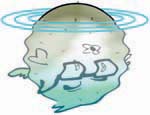Blowfish
Back to Contents of Issue: May 2002
|
|
||
 Down and out. Don't expect to leave a Japanese jail with much money in your wallet. A recent book entitled Keimusho no Subete (Everything About Prison) (Nihon Bungeisha, JPY1,300) informs readers that prison inmates put in eight-hour workdays for about 22 days a month. Starting as an apprentice, you'll receive about JPY4.5 per hour, which nets you JPY790 a month in wages. Of course, there is no charge for room, board, medical treatment and other necessities. Job skills are rated on 10 levels. Work your way up to the level of master craftsman, and you'll make all of JPY6,089 a month. Other fascinating information: Should you die in prison due to a work-related accident, an insurance policy will pay your designated beneficiary as much as JPY4.43 million (compensation is also provided for mishaps). The main crimes for which Japanese are incarcerated are theft (29.7%), drug abuse (23.3) and fraud (6.6) for males; drug abuse (47.4), theft (20.5) and fraud (8.5) for females. Down and out. Don't expect to leave a Japanese jail with much money in your wallet. A recent book entitled Keimusho no Subete (Everything About Prison) (Nihon Bungeisha, JPY1,300) informs readers that prison inmates put in eight-hour workdays for about 22 days a month. Starting as an apprentice, you'll receive about JPY4.5 per hour, which nets you JPY790 a month in wages. Of course, there is no charge for room, board, medical treatment and other necessities. Job skills are rated on 10 levels. Work your way up to the level of master craftsman, and you'll make all of JPY6,089 a month. Other fascinating information: Should you die in prison due to a work-related accident, an insurance policy will pay your designated beneficiary as much as JPY4.43 million (compensation is also provided for mishaps). The main crimes for which Japanese are incarcerated are theft (29.7%), drug abuse (23.3) and fraud (6.6) for males; drug abuse (47.4), theft (20.5) and fraud (8.5) for females.
She's the boss. According to information from the Teikoku Data Bank, Japan had 64,803 female company presidents. The number might seem impressive until you realize this is out of a total of 1,156,735 registered companies. Which gives the gals 5.6 percent of the nation's total. Sunday Mainichi magazine compiled a listing of the top 10 universities Japan's female presidents had attended. In descending order they were Nihon University, Japan Women's University, Aoyama Gakuin, Keio, universities abroad, Kyoritsu Women's University, Waseda, Meiji and Sacred Heart. The price is tadashii. Kuraray asked 500 male and female wage earners in Japan's two largest metropolitan areas how much they felt certain items should cost. Here are the average responses: a men's suit JPY27,070, golf green fees JPY10,480, overnight accommodation in a business hotel JPY6,210, full-course meal at a French restaurant JPY5,550, beauty salon treatment JPY3,330, basic monthly charge for a cellphone JPY2,090, movie theater admission JPY1,090, lunch JPY650, a bowl of ramen noodles JPY510, medium-size mug of draft beer JPY350, cup of coffee JPY220. What items, in general, are regarded as too expensive? The five items cited were: highway tolls (named by 53.3% of respondents), the 5 percent consumption tax (46.3), medical fees (35.9), cellphone user rates (25.8) and cinema tickets (17.0). Respondents were also asked if they felt some resistance or anxiety over buying low-priced goods. A total of 38.5 percent answered yes, while 60.8 percent replied in the negative. It's worth it. Chemical firm Kuraray questioned 500 people in the greater Tokyo and Osaka areas on what type of items might justify paying a premium. Their answers: limited edition goods (52.6%), books (25.8), classical music concerts (23.6), tickets to World Cup games (22.7), aesthetic salons (17.2), medical treatment (15.0), consumption tax (13.9), tickets to sumo tournaments (9.9), child's attendance at private cram schools (6.4) and cinema tickets (4.4). At loggerheads. Interscope asked 1,500 people age 15 and above in the greater Tokyo area what type of Web sites they visit most frequently. Search engines topped the list with 96 percent. These were followed by news and weather (82.6%), maps and directions on how to go places (81), online shopping malls (70.4), applications for travel and leisure (67.3), sports news (64.7), information and reservations for dining out (64), research for purchasing computer-related goods (61.8) and purchasing books and periodicals (59.3). Looking for the lost. Here's what you can get for the pet that has everything. Pet services insurance starts at JPY1,400 a month plus a JPY2,000 one-time membership fee. Recently lost your dog? A service will charge JPY8,800 to search for a medium sized dog. Canine psychological counseling costs JPY5,000 for a set course including a tranquilizer mixed into the food. Obedience training starts at JPY50,000 for a one-month course. Home-visit grooming costs JPY4,000 to JPY6,000 a visit, plus a registration charge of JPY3,500 for the first year and JPY3,000 for subsequent years. And studio portrait photographs run JPY29,000 and up for a set of 15 shots. Should we call it defuzzed maybe? When precision instrument manufacturer Rikoh Elemex of Nagoya interviewed 13,000 men around the country about their hair or lack thereof, it discovered that 51 percent of the respondents said they found the word hage (bald) to be discriminatory. Instead, they preferred to be described by such nomenclature as usuge (thinning hair), "skinhead" and pikarin (shiny domed). The subjects named actor Naoto Takenaka and entertainer George Tokoro as thinning individuals who stood out from the erstwhile hairy crowd. @ |
||
Note: The function "email this page" is currently not supported for this page.






